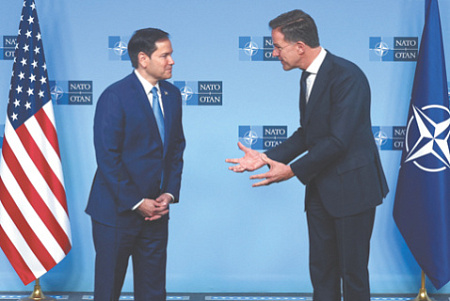
Even if the Russian-Ukrainian conflict ends, Russia will be perceived by NATO as a likely adversary for many more years, according to statements made by participants in the meeting of the alliance’s foreign ministers in Brussels. They state that trust in relations with Moscow has been undermined. But with the United States, as they assured in Brussels, the NATO allies are not going to quarrel. Secretary of State Marco Rubio, who was present at the event, assured that his country would not withdraw from the alliance, although he expects that significant changes will take place in it.
The meeting of the foreign ministers of the NATO countries took place against the background of seriously strained relations between the United States and its allies in the alliance due to the increase in duties by the White House, as well as Donald Trump’s active efforts to achieve peace between Russia and Ukraine. Both the trade war and the negotiation process with the Kremlin are among those on which the United States has accumulated many questions, especially in Europe. Therefore, Rubio was, perhaps, the main guest of the two-day ministerial meeting, taking place from April 3 to 4. In addition, the Secretary of State is an experienced politician with considerable experience in interacting with the country’s foreign partners. This compares favorably with the head of the Pentagon, Pete Hegseth, and Vice President Jay Dee Vance, who visited Europe and made controversial statements there. Rubio is suitable for the role of a “good policeman” from the Trump team or someone who is able to smooth out the impression of the most drastic actions of the White House administration.
His speech at the ministerial meeting partially justified the hopes of many European experts, politicians and the press. Rubio has unequivocally stated that Trump is not going to withdraw the United States from NATO. The Secretary of State called suggestions to the contrary “hysteria that needs to be ended.” According to Rubio, “the US president has made it clear that he supports NATO and that we plan to remain in NATO.”
The Secretary of State, repeating Trump’s demand to the allies about the need to increase defense spending by all alliance member countries to 5% of GDP, at the same time emphasized that it also applies to the United States. “We want to leave here with the understanding that there is a realistic way (to change NATO. – NG) and that each of the alliance’s members will commit to achieving the 5% target and fulfill it,” Rubio said. He reminded the audience that “the threats are high,” which means we need to act quickly.
It also did not escape the observers that Rubio did not talk about Greenland, the Danish autonomy, which Trump is known to be planning to annex. The program of the visit included his talks with Danish Foreign Minister Lars Loekke Rasmussen, where, of course, this topic was raised. The State Department’s press service, however, succinctly stated that the two officials discussed “topics of common interest.” These include defense spending and threats to the alliance, “coordination of efforts to ensure security in Europe and, in particular, in Ukraine.” Greenland was not mentioned.
NATO Secretary General Mark Rutte also spoke about the threats before the meeting. He called the long-term task of the alliance to protect the territories of its member countries from a possible invasion by the Russian Federation. Rutte called this invasion “our long-term threat, which will remain even after, I hope, an agreement on Ukraine is concluded.”
From the meeting of the alliance’s ministers, the press expected an answer to an important question that cannot but affect the negotiation process between the United States and the Russian Federation: have NATO’s doors really closed for Ukraine? During his trip to Europe, Hegseth unequivocally stated that the country’s accession to the alliance is excluded: this is the position of the Trump administration. Meanwhile, reports appeared in a number of media outlets, citing sources in NATO structures, that perhaps the head of the Pentagon was overly categorical. The Alliance has not made an official decision to refuse to accept Ukraine into its ranks. On the first day of the meeting in Brussels, the ministers did not clarify this issue.
But there was clarity about the information disseminated by The Washington Post. She reported on the existence of a secret Pentagon document, according to which the United States considers the protection of Taiwan from China to be its primary task, and other issues, including the confrontation with Russia, are attributed, if not exclusively, then to a very large extent, to its European allies (see NG dated 03/30/25). Rutte, answering journalists’ questions, actually confirmed that indeed the US foreign policy priorities have now shifted from the west to the east. At the same time, he considered such a change justified. “It makes sense that the Europeans should play an increasingly important role in protecting Europe,” he said.
The participants of the meeting in Brussels did not comment on the topic of negotiations between the Russian Federation and the United States to the Western press except on condition of anonymity. The general tone of the comments boiled down to one thing: Washington’s allies want the decisions taken during this dialogue not to come as a surprise to them. They are particularly concerned about the prospect that an agreement with Moscow could weaken cooperation between the United States and Europe.
